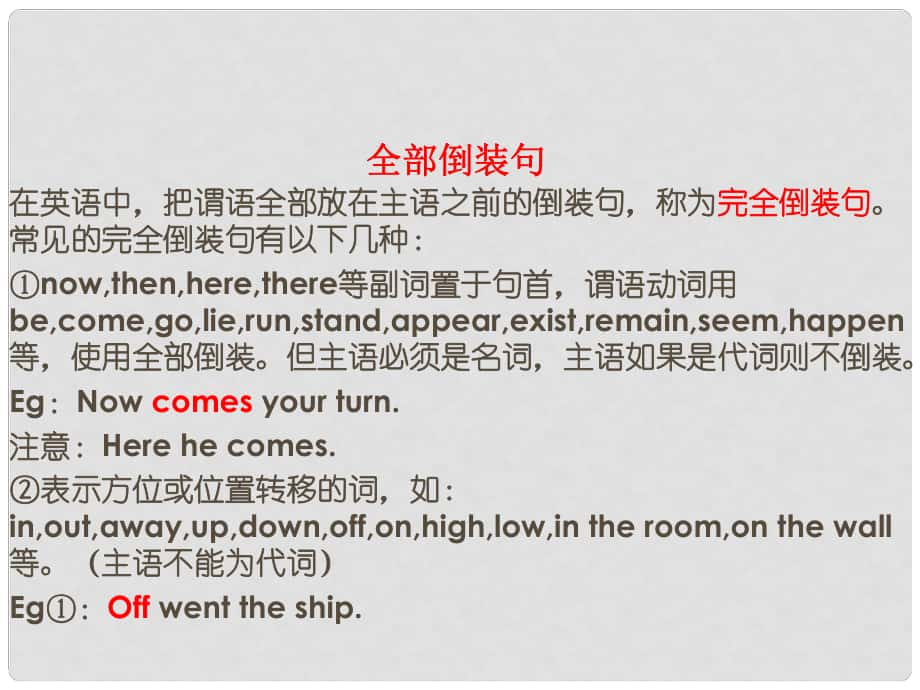《河南省洛陽市中成外國(guó)語學(xué)校高三英語一輪復(fù)習(xí) 倒裝結(jié)構(gòu)課件》由會(huì)員分享�����,可在線閱讀�����,更多相關(guān)《河南省洛陽市中成外國(guó)語學(xué)校高三英語一輪復(fù)習(xí) 倒裝結(jié)構(gòu)課件(13頁珍藏版)》請(qǐng)?jiān)谘b配圖網(wǎng)上搜索�。
1、全部倒裝句全部倒裝句在英語中�����,把謂語全部放在主語之前的倒裝句����,稱為在英語中,把謂語全部放在主語之前的倒裝句��,稱為完全倒裝句完全倒裝句���。常見的完全倒裝句有以下幾種:常見的完全倒裝句有以下幾種:now,then,here,there等副詞置于句首����,謂語動(dòng)詞用等副詞置于句首,謂語動(dòng)詞用be,come,go,lie,run,stand,appear,exist,remain,seem,happen等���,使用全部倒裝����。但主語必須是名詞�,主語如果是代詞則不倒裝。等����,使用全部倒裝。但主語必須是名詞���,主語如果是代詞則不倒裝。Eg:Now comes your turn.注意:注意:Here he comes.表
2�����、示方位或位置轉(zhuǎn)移的詞����,如:表示方位或位置轉(zhuǎn)移的詞���,如:in,out,away,up,down,off,on,high,low,in the room,on the wall等。(主語不能為代詞)等�。(主語不能為代詞)Eg:Off went the ship.Eg:In a big of a big room lies a big man.地點(diǎn)狀語放在句首,用全部倒裝�����。(主語不能為代詞)地點(diǎn)狀語放在句首�,用全部倒裝。(主語不能為代詞)Eg: North(adv.) off the city lies the school.有時(shí)為了強(qiáng)調(diào)表語�����,把表語置于句首�����,使用全部倒裝����,倒裝結(jié)構(gòu)有時(shí)為了強(qiáng)調(diào)表語,
3����、把表語置于句首�,使用全部倒裝���,倒裝結(jié)構(gòu)為:為:“表語表語+系動(dòng)詞系動(dòng)詞+主語主語”:adj.+系動(dòng)詞系動(dòng)詞+主語主語Eg:Present at the meeting were Thomas Johnson.B. 過去分詞過去分詞+系動(dòng)詞系動(dòng)詞+主語主語Eg:Gone forever are the days when we had not enough food to eat.C. 介詞短語介詞短語+系動(dòng)詞系動(dòng)詞+主語主語Around the garden are some small trees and a shortfence.such放在句首時(shí)經(jīng)常用全部倒裝:放在句首時(shí)經(jīng)常用全部倒裝:
4���、Eg:Such was Albert Einstein.Eg: Such are his words.直接引語放在句首,這種情況可倒裝�����,也可不倒裝�����,但主語若是直接引語放在句首���,這種情況可倒裝�����,也可不倒裝,但主語若是代詞時(shí)����,不倒裝��。代詞時(shí)�����,不倒裝�����。Eg:“Either you or I am mad”said Mr.Johnson.(Mr.Johnson said /he said).部分倒裝部分倒裝將謂語的一部分如:將謂語的一部分如:be 動(dòng)詞���,助動(dòng)詞或情態(tài)動(dòng)詞置于主語之前,動(dòng)詞�����,助動(dòng)詞或情態(tài)動(dòng)詞置于主語之前�,稱為部分倒裝。稱為部分倒裝�。在疑問句中,疑問詞不作主語時(shí)����,必須倒裝��。在疑問句中�����,疑問
5���、詞不作主語時(shí),必須倒裝���。Eg:How do you go to school every day�?Eg:When did you finish the work?句首為否定���,半否定詞或詞語時(shí)��,如句首為否定����,半否定詞或詞語時(shí)���,如no,not,never,seldom,little,hardly,at no time,by no means,no sooner,not until等時(shí)���,部分倒裝�����。等時(shí),部分倒裝�。Eg:By no means is smoking allowed in the classroom.Eg:Never in my life have I seen such a terri
6、ble accident.Not onlybut also用來連接兩個(gè)并列句����,且not only 放在句首時(shí),not only引導(dǎo)的句子要倒裝�����,but also 的句子不倒裝����。Eg:Not only can he speak English,but also he can speak French.Eg:Not only the students but also all the teachers took part in the sports meeting.(后跟代詞)only 用來修飾狀語放在句首時(shí)�,用倒裝(主句倒裝,從句不倒裝)��,only不是修飾狀語也不倒裝�����。Eg:Only when
7、he told me about it did I know it.Eg:Only then did we realize that we were wrong.注意:Only he knows the truth.(Only修飾的不是狀語)so用在句首��,表示一種肯定的事實(shí)也適合于另一個(gè)人����,用全部倒用在句首,表示一種肯定的事實(shí)也適合于另一個(gè)人�����,用全部倒裝�����;如果兩句話敘述的是同一主體同一內(nèi)容���,即后句只是前句的重裝��;如果兩句話敘述的是同一主體同一內(nèi)容���,即后句只是前句的重復(fù),則不要倒裝�。復(fù),則不要倒裝。neither或或nor放在句首�����,表示一種否定的事實(shí)也放在句首�,表示一種否定的事實(shí)也適合于另一個(gè)人
8、時(shí)�,用全部倒裝����。適合于另一個(gè)人時(shí),用全部倒裝���。Eg:He likes swimming, so do I.Eg:-He has done a good job. -So he has.Eg:We dont like the film,nor do they.虛擬語氣中�,把從句虛擬語氣中�,把從句if省略,將省略���,將were���,had或或should置于主語之置于主語之前,構(gòu)成部分倒裝����。前���,構(gòu)成部分倒裝。(1)Had I not been for the traffic jam,I should have already been here.(2)Were I ten years younger,I
9�����、 would learn playing the piano.(3)Should it rain���,the journey would be more unpleasant.as,though引導(dǎo)讓步狀語從句時(shí)采用形式倒裝的情況:引導(dǎo)讓步狀語從句時(shí)采用形式倒裝的情況:(1)表語的倒裝:)表語的倒裝:Eg:Tired as/though he was,he still went on with his work.Eg:Strange as/though it seems,it is true.Eg: Exhausted as/though she was,she wasnt able to sle
10�、ep.(2)謂語動(dòng)詞的倒裝:謂語動(dòng)詞的倒裝:Eg: Try as he might,he didnt pass the exam.Eg:Search as they would here and there,they could find nothing in the room.(3)狀語的倒裝:)狀語的倒裝:Much as he likes the bike,he doesnt want to buy it.Hard as I studied,I could not catch up with them.注意:如果是單數(shù)名詞或形容詞的最高級(jí)作表語�,不再用冠詞:Eg:Young as he i
11、s in our class, he speaks English well.引導(dǎo)結(jié)果狀語從句的引導(dǎo)結(jié)果狀語從句的sothat 或或suchthat置于句首時(shí)���,主句置于句首時(shí)�����,主句部分倒裝��,部分倒裝���,that從句不倒裝(主導(dǎo)從不倒)。從句不倒裝(主導(dǎo)從不倒)。Eg:So easy is the exercise that a child can work ikt out.Eg: Such a kind man does he look that we all like him.某些表示祝愿的句子中�����,謂語動(dòng)詞或謂語的一部分放在主語的前某些表示祝愿的句子中��,謂語動(dòng)詞或謂語的一部分放在主語的前面��。面
12���、。Eg:Long live the Peoples Republic of China.Eg:May you succeed.練習(xí)題練習(xí)題1. I finally got the job I dreamed about. Never in my life _so happy.A.did I feel B.I felt C.I had felt D. had I felt2.Not a single song _ at yesterdays party.A.she sang B. sang she B.C. did she sing D. she did sing3.Only when the
13��、war was over _ to his hometown.A. did the young soldier return B. the young soldier returnedC. Returned the young soldier D. the young soldier did returnACA_snacks and drinks, but they also brought cards for entertainment when they had a picnic in the forest.A.Not only they brought B. Not only did t
14�、hey bringC.Not only brought they D. Not only they did bring,Carolina couldnt get the door open.A.Try as she might B. As she might tryC. She might as try D. Might she as try-Its burning hot today , isnt it�?-Yes._yesterday.BAAA. So was it B. So it was C. So it is D. So is it_homework did we have to do
15、 that we had no time to take a rest.A.So much B. Too much C. Too little D. So little_by keeping down costs will PowerData hold its advantage over other companies.A. Only B. Just C. Still D. YetAANever in my wildest dreams _these people are living in such poor conditions.A.I could imagine B. could I imagineC. I couldnt imagine D. couldnt I imagine-Maggie had a wonderful time at the party.-_, and so did I.A.So she had B. So had sheC. So she did D. So did sheBCThank you�����!
 河南省洛陽市中成外國(guó)語學(xué)校高三英語一輪復(fù)習(xí) 倒裝結(jié)構(gòu)課件
河南省洛陽市中成外國(guó)語學(xué)校高三英語一輪復(fù)習(xí) 倒裝結(jié)構(gòu)課件

